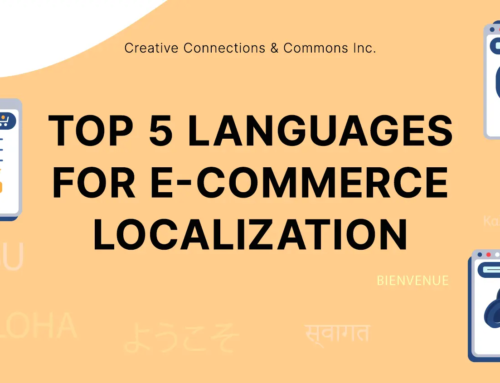Capturing more markets is part of any business’s expansion strategies. However, given that customers from potential areas have unique needs, decision makers face more challenges. That’s why it’s vital localize your business correctly to ensure growth and sustainability. We list 10 reasons to consider adopting a brand localization strategy for your next expansion campaign. Take a look.
Key takeaways:
- When you localize your business, benefits include enhancing customer experience, boosting sales and revenue, and gaining a competitive advantage.
- Business localization involves adapting a company’s products, services, and strategies to meet a target market’s linguistic, cultural, and regulatory requirements.
- Understanding what is localization in business gives decision-makers and executives insights into their next business campaign.
Table of contents:
- What Is Localization in Business?
- Demonstrate Cultural Sensitivity and Respect
- Improve Brand Perception
- Increase Customer Loyalty and Trust
- Provide Better User Experience
- Remain Legally Compliant
- Obtain Market Insights and Intelligence
- Expand Market Reach
- Enhance Global Presence
- Grab Opportunities for Innovation
- Adapt to Technological Advancements
- CCC: Professional Business Localization Services
What Is Localization in Business?
Simply put, business localization is a process rooted in translation. Its goal is to adapt a business’s products, services, and marketing strategies to a target market. This target market has unique linguistic, cultural, and regulatory requirements. Thus, the challenge lies in ensuring a company meets these items while maintaining an identity.
Although translation plays a significant role in localization, the entire process goes beyond adapting languages. Essentially, localization aims to create a culturally relevant experience for customers. For instance, while a company communicates with a market in its local language, it also customizes offerings according to preferences.
Note: Most of the literature on localization is based on Western experiences, particularly when it comes to food system models. One 2023 study explored how these Western sensibilities are applicable to non-western cities, specifically Nanjing, China. In summary, this study advocates for a nuanced approach to food localization that incorporates local realities.
Demonstrate Cultural Sensitivity and Respect
Any successful brand localization strategy is rooted in showing respect for a target market’s cultural norms, values, and sensitivities. When you localize your business, you demonstrate that your company values diversity. Moreover, you tell potential customers that you are committed to engaging with them in a culturally appropriate manner.
Maintaining corporate social responsibility (CSR) is another element of localization as a service. By respecting a target market’s cultures in their localization efforts, businesses prove their commitment to ethical conduct and social responsibilities.
Pro-tip: CSR is a common element of a business’s public relations campaign. If your brand already conducts such strategies, incorporating localization is likely going to improve its effects.
Improve Brand Perception
Business localization enhances brand reputation in local and international markets. Simply put, committing to providing personalized experiences to your customers differentiates you from competitors.
In addition, businesses that localize services and experiences for their customers minimize the risk of offending and damaging brand reputation. By adapting messaging to align with a market’s cultural sensitivities, the company ensures proper and appropriate localized content.
Increase Customer Loyalty and Trust
Speaking the language of your customers and understanding their cultural contexts allows you to strengthen relationships with them. Respect is a foundational element in any relationship. Thus, when you localize your business, you foster trust and loyalty among customers.
With enhanced brand credibility and a loyal customer base, the likelihood of positive interactions increases. Accordingly, you can build long-term relationships with customers from global markets just by connecting with them through their values, customs, and traditions.
Provide Better User Experience
Localization enhances the user experience of international customers. Since you make your products and services more accessible to specific locales, your brand almost instantly becomes user-friendly. This accessibility takes form in various content, including website localization and multilingual customer support.
With localized websites, customers who find your online pages when searching for local businesses can easily relate to your content. Meanwhile, having a dedicated customer support team that speaks your customer’s language ensures their comfort when seeking assistance.
Remain Legally Compliant
Many countries have specific language regulations in certain areas. In particular, business communications, product labeling, and marketing materials must meet these regulations. Localizing your business through professional business localization services ensures compliance with these requirements.
Professional localization providers like CCCI ensure that all business content you publish is compliant. These professionals would translate your content into the official languages of your target market. Failure to adapt to an official or even widely spoken language may constitute legal penalties.
Furthermore, data protection and privacy laws vary globally. Markets could follow the European Union’s General Data Protection Regulation (GDPR) or the California Consumer Privacy Act (CCPA). Providing transparent privacy policies in a target market’s official language further improves customer trust and protects against reputational damage.
Obtain Market Insights and Intelligence
Localization provides businesses with valuable insights into market trends and consumer behaviors. Accordingly, they can navigate competitive landscapes successfully. Through localized content, businesses engage with customers in their native languages. Thus, they can gather data through feedback that can inform future strategies and campaigns.
Having a deep understanding of local markets allows businesses to identify emerging trends. With this intelligence, businesses can anticipate customer needs and stay ahead of competitors. For example, the business can tailor product offerings and adjust pricing strategies to meet local consumer needs.
Expand Market Reach
Localizing your business is a strategy to tap into new markets and reach a wider audience. By translating content into local languages and adapting offerings to suit local trends and preferences, businesses can reach potential customers. Thus, brands diversify revenue streams by having multiple demographics.
Having a wider market reach also helps businesses differentiate themselves from competitors. Through localization, businesses tailor their offerings to meet specific needs. Thus, the localized experiences they offer are more likely to resonate with target audiences than competitors without established localization strategies.
Enhance Global Presence
Localization strengthens a business’s global presence. It also establishes a brand as a major player in international markets. Adapting marketing strategies and offerings to meet the expectations of diverse audiences declares a brand globally competent. Thus, it positions the brand for long-term success.
With an enhanced global presence, a brand enjoys recognition and credibility. These qualities make it easier to attract customers and partners, improving worldwide opportunities. For instance, your localization strategy might include website localization. When potential customers find options to view your pages in their native language, they will stay to learn more.
Grab Opportunities for Innovation
Your organization has the opportunity to innovate and express creativity through localization. For instance, expanding into new markets presents teams with challenges to think outside the box. You must adapt products and services that meet diverse preferences. When planning for solutions, your team may develop new ideas that you might have not considered yet.
Fostering a culture of experimentation and innovation within your organization drives continuous growth. With this constant improvement, your company would better serve people across diverse cultures while maintaining satisfaction among them.
Adapt to Technological Advancements
Technology rapidly evolves. Therefore, businesses must remain on top of these advancements to ensure relevant digital assets. Optimizing websites, apps, and online platforms of your business for local devices, networks, and user preferences is vital in localization. By localizing digital experiences, businesses maximize engagement.
Staying in the loop of technological advancements and adapting your digital offerings accordingly allows your business to remain competitive. Staying relevant in an ever-changing digital landscape demands constant updating of methods.
CCC: Professional Business Localization Services
Adapting business offerings and marketing strategies to suit the preferences of diverse audiences expands business reach, ultimately increasing market share. Furthermore, multilingual localization establishes a brand as a global leader in its respective industry. Get in touch with our language professionals at CCCI to discuss how to approach your localization strategy. Contact us.









